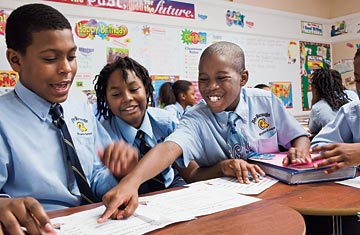
From left: Rodney Thomas, Tyreke Johnson and Malik Harris, at Burroughs Education Center in Washington, look at their payment vouchers
(8 of 9)
Just like grownups, kids need different kinds of incentives to get through the day, some highbrow and some low, some short-term, some longer-term. And money and other external rewards can be a gateway to more substantive motivators. KIPP fifth-graders get a lot of prizes like pencils; high school kids can earn freedoms--like the privilege of listening to their iPods at lunch. "Our ultimate goal is to get kids to be intrinsically motivated," says Joshua Zoia, who founded the KIPP Academy in Lynn, Mass. "But we have to get kids hooked in. We have to meet them where they are."
When Fryer briefed Rhee, the Washington schools chancellor, about the results, she was shocked--happily so. "It is just so hard to show impact in education," Rhee says, citing past experiments that showed no payoff despite enormous effort. "We don't see results like this for a lot of other things we're doing," she says. So she went to the Washington city council to ask for more money to keep paying kids--and to keep studying what happens. "If next year's data show something different, so be it," Rhee says. "We'll take it year by year." The program has wound down in Chicago, Dallas and New York City, although schools in all three places continue to experiment with incentives.
Fryer believes there's more good research to be done on incentives. But he doesn't think incentives alone can fix our schools; he is increasingly convinced that the answer will involve a combination of reforms and that the interaction among those reforms will matter more than any single change in isolation. And whatever we do, he says, we have to test it first--and fearlessly. "One thing we cannot do is, we cannot restrict ourselves to a set of solutions that make adults comfortable."
Chyna is an eighth-grader at the Takoma Education Campus in Washington. Chyna likes to refer to herself in the third person, and when you ask her a personal question, she looks you dead in the eye, asks, "Honestly?" and waits for you to reply before giving you her answer.
Chyna wants to be a lawyer or a radio personality when she grows up. But last year she had a hard time. She and a friend got into a fight with another girl at school. "We basically jumped her," Chyna admits. The police came, and Chyna found herself in a juvenile-detention center, waiting for her mom to pick her up.
This year is going better. When I meet her, she has just received her regular paycheck. She earned $95, her highest check yet. She squeals with happiness and hugs her girlfriends. When I ask her how she did it, she says, "I tried my hardest." She adds, "I tried to wear my uniform, because I knew I wanted some money because my birthday is next week." She has saved her past four paychecks for this reason. The money, she says, gives her just enough incentive to hold her tongue.
"For the most part, I'm still Chyna," she says. "But once in a while I just snatch it back, 'cause I know that paycheck is coming." Then I ask her about the psychologists' argument that she should work hard for the love of learning, not for short-term rewards. "Honestly?" she asks. "Yes, honestly," I say. She looks me dead in the eye. "We're kids. Let's be realistic."
Two Dollars a Book?
